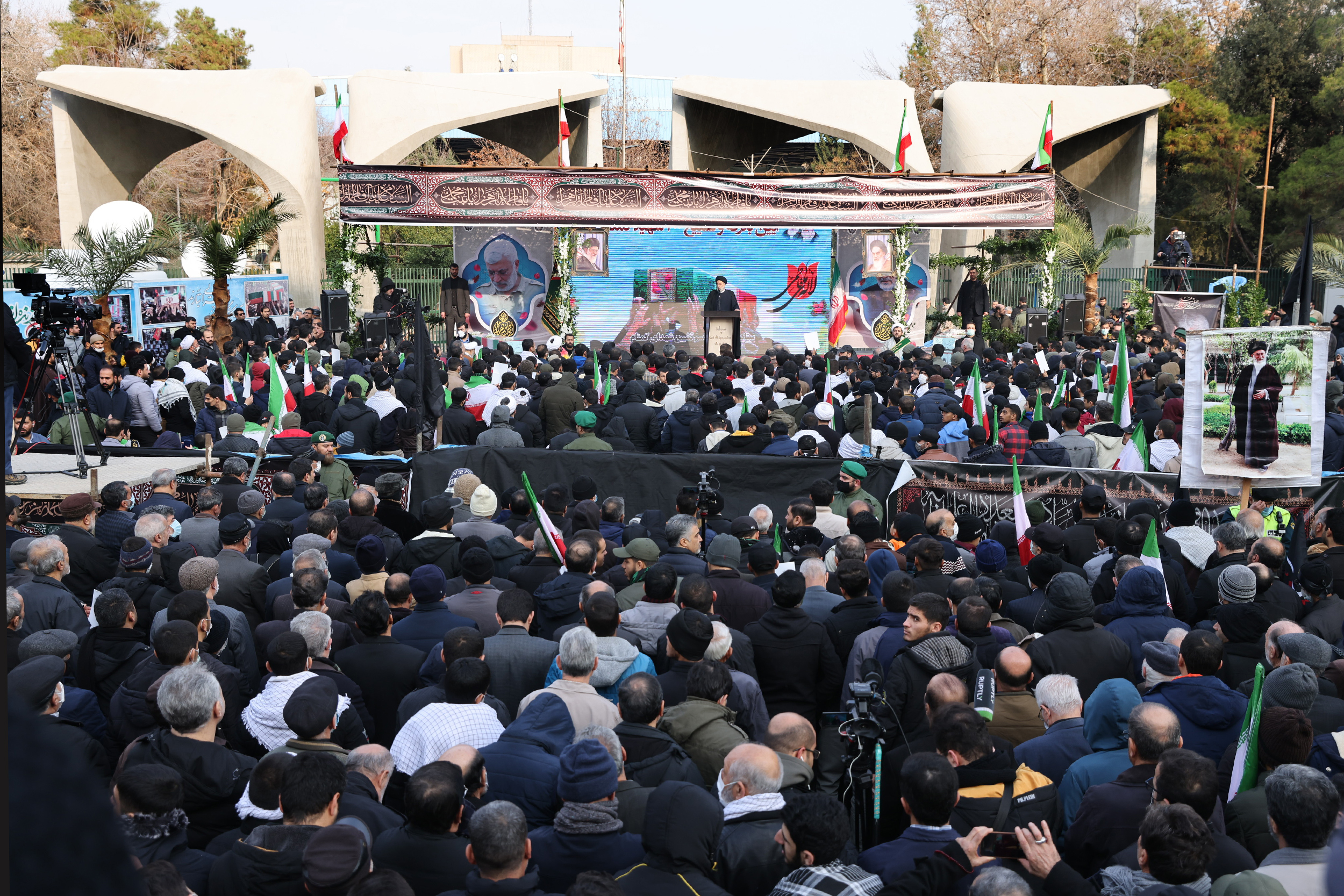Iran President Pledges “No Mercy” For Protesters
By Nargiz Mammadli December 30, 2022

Iran’s President Ebrahim Raisi has vowed that “no mercy” will be shown to those who took part in the recent anti-government protests.
“The arms of the nation are open to all, but we will not show mercy to the miscreants,” President Raisi said while addressing nation on December 27, according to the official website of the Iranian president.
Referring to the “enemies” of the Iranian nation, he said that “you thought you could achieve your goals by creating rumours and rioting, while you have experienced this path many times and failed, why did you make a mistake in your calculations again?”
“The country has made a lot of progress and that is why the enemy is angry,” the president added.
Since mid-September, Iran — a country of over 85 million people — has been rocked by countrywide protests. Protests in Iran were triggered by the death of 22-year-old Mahsa Amini, a young Iranian-Kurdish woman who was detained by the country’s morality police for allegedly violating the Islamic Republic’s strict dress code.
The anti-government protests, largely fueled by the middle and upper classes, pose one of the biggest threats to the country’s leaders. Protests of this scale have not been seen in Iran since the 2009 Green Movement brought millions to the street. Tehran accuses the West and foreign-based media of inciting the unrest.
As of December 28, Iran’s security forces killed at least 507 people in the crackdown on the protests, including 69 under the age of 18, according to the foreign-based Human Rights News Agency (HRANA). Nearly 18,500 people have been arrested, of whom at least two have been executed, 11 are on death row and 47 others are facing the death penalty on the charges of “enmity against God,” “rebellion” or “corruption on Earth.”
On December 27, Iran’s Supreme Human Rights Council Secretary Kazem Gharibabadi dismissed reports of sexual abuse of detained female protesters revealed by imprisoned activist Narges Mohammadi. Earlier, Mohammadi wrote a letter to the BBC, in which she detailed horrific acts of physical abuse and sexual violence against detained female protesters in Evin prison. Gharibabadi rejected the letter, citing a recent visit to Gharchak prison in Tehran Province during which “no mention or complaints about sexual abuse were raised.”
The head of the Justice Department of Tehran Province, Ali Alqasimehr, said on December 26 that 83 percent of those in the province imprisoned over the course of the current cycle of countrywide protests have been released. Those who remained in custody were “part of the main elements and leaders of the riots,” he added.
Protest-hit Iran welcomes Musk’s internet service offer
28/12/2022 Wednesday
AA

SpaceX Chief Executive Elon Musk
Iran on Wednesday welcomed SpaceX Chief Executive Elon Musk’s announcement about providing 100 active Starlinks to the Islamic Republic.
Speaking following a Cabinet meeting in Tehran, Minister Information and Communications Technology Issa Zarepour said Tehran welcomes the offer “provided it complies with the laws."
In a tweet on Monday, three months after he promised to activate the internet service in Iran, Musk announced that his company is close to having 100 active Starlinks in the country.
“Approaching 100 Starlinks active in Iran,” Musk wrote in response to a tweet that read there is “more freedom for the women (in Iran) to choose whether they cover their hair or not."
The US-based billionaire, who recently bought Twitter in a record-breaking deal, had in September said he would activate Starlink in Iran as part of an effort "to advance internet freedom and the free flow of information" to Iranians.
The offer came amid sweeping protests across the country over the death of a young Iranian woman, Mahsa Amini, in police custody.
In order to quell angry protests, Iranian authorities imposed curbs on accessing the internet while blocking many social media platforms, including Whatsapp and Instagram.
“According to the laws, any satellite operator that intends to provide internet services in the Islamic Republic of Iran must comply with the laws of the country,” Zerepour said on Wednesday.
He stressed that the Iranian laws “apply to all operators providing satellite internet services”, including Musk-owned Starlink and London-based One Web.
The minister said both companies have been notified that if they adhere to the country’s rules and regulations, they are “welcome to have their activities in the country”.
Regarding reports about some telecom companies incurring losses worth billions of dollars as a result of filtering in recent months amid protests, Zarepour said only Rightel Telecommunications has declared bankruptcy so far.
Iran has been rocked by widespread protests in recent months, resulting in the death of more than 200 people, according to officials. Foreign human rights groups, however, have put the death toll at more than 450.
The filtering of social media and low internet has been part of measures taken by the government to restore calm, but the measures have been widely criticized.
No comments:
Post a Comment